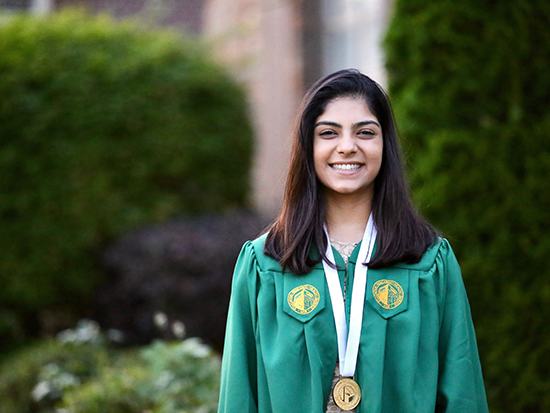Media contact: Brianna Hoge
University of Alabama at Birmingham alumna and Stanford University graduate student Shreya Malhotra was named among the fifth cohort of Knight-Hennessy Scholars, the largest fully endowed graduate fellowship in the world.
alumna and Stanford University graduate student Shreya Malhotra was named among the fifth cohort of Knight-Hennessy Scholars, the largest fully endowed graduate fellowship in the world.
The fellowship aims to create a multidisciplinary and multicultural community of graduate students across Stanford University and deliver engaging experiences that prepare graduates to be visionary, courageous and collaborative leaders who address complex challenges facing the world.
“I am incredibly honored and excited to be a part of the 2022 cohort of Knight-Hennessy scholars,” Malhotra said. “The fellowship provides a diverse community with people from all over the world seeking degrees in many different programs at Stanford. All are interested in solving interesting problems with global impact and I am very excited to meet these incredible individuals.”
Malhotra is an Indian-Canadian dual citizen raised in Birmingham, Alabama, who graduated from UAB in 2020 with a bachelor’s degree in neuroscience and a master’s degree in public health and was a part of the UAB Honors College's Science and Technology Honors Program. She now is pursuing an M.D. and Ph.D. in neuroscience at the Stanford School of Medicine.
Learn more about UAB’s first ever Knight Hennessy Scholar here.
“Being named a Knight-Hennessy scholar represents a monumental achievement and a life-changing opportunity,” said Michelle Cook, Ph.D., director of the UAB Office of National and International Fellowships and Scholarships. “Shreya’s recognition here speaks volumes, not only of her own intellectual merit and potential to be a visionary leader in her field, but to the strength of her undergraduate training at UAB as well.”
During her four years at UAB, Malhotra learned to become an effective advocate for social justice, a team player and a researcher.
“UAB provided me with the mentors and opportunities I needed to realize and pursue my passions,” she said. “I was heavily involved with organizations such as Women in STEM, the Social Justice Advocacy Council and International Mentors. UAB taught me the importance of being an authentic person and helped me pursue the things I highly valued.”
Malhotra aspires to be a physician-scientist working to fight prevalent neurological diseases worldwide. She wants to contribute to the circuit-level understanding of neurological diseases to help create therapies that can be disseminated worldwide.
“I hope to help find creative ways to increase global collaboration in neuroscience research to allow for both greater knowledge sharing and creation of therapies that are more accessible to low-income countries,” she said.